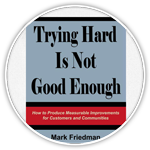Reasons to Invest in the Well-being of Children and Families
People support investments in the well-being of children and families for many different reasons. The following Afirst person@ profiles explore some of the most important reasons from the perspective of different county, city and community partners.
1. County Supervisor or Commissioner:
AElected office is no picnic today, if it ever was. And it is pretty common for the motives of elected officials to be impugned. But I can tell you that one of the most important reasons I went into public life was because I was concerned about the quality of life in my community for my own children and my neighbors’ children. This may get lost in the “issue of the day” environment in which we work, but it is always there. What has frustrated me most is the way all the competing interests struggle with each other for money and lose sight of what needs to be accomplished. We need to rise above the fray and look at how children and families are doing in our community and how different partners need to work together to make things better. Then we can put the daily battles in perspective and maybe make better choices with the scarce money we have. I would help identify the money, if we could find ways to invest now in children and families and avoid the problems and cost later on …even if Alater on@ is not during my term. If we could do it in the next two years, investments in children and families might even help me get reelected.
2. Parent:
AI don’t understand all this jargon people use. I think they sometimes deliberately try to make me look stupid with the way they talk. But I stick with it because I know that these things matter to my kids. And I’m one of the few people in these meetings who knows what it’s really like to have a kid in trouble and try and get through the system. I’m not sure what all this talk about investment is. But I do know that we better start dealing with children’s problems early. Because when we don’t they get out of hand real fast. It doesn’t take a genius to know that you pay now or you pay later. It would be nice to find some way to talk about this stuff that ordinary people can understand. But I’ll be here either way.
3. Chief Administrative Officer or County Executive:
AMy interest is beyond projects and special pleadings. I have some responsibility for the well being of the whole county and its population. I’m not interested in funding programs just because they happen to be popular. I want to fund things that work. What’s most on my mind frankly is the steady escalation in the cost of treating troubled families and children, whether it’s in juvenile hall or foster care. The growth in these kinds of costs represents a decline in the quality of life of the county and robs us of resources we could use for positive things. As long as we think about this problem one year at a time we will always be paying more. To get ahead of this we need to think in investment terms. And if we’re smart about it, when we’re successful we’ll capture the proceeds of that success and reinvest it. Now we need to figure out two things: what will work to reduce the long term costs and cost growth, and how can we track this so we capture and reinvest the savings.
4. Chief Financial Officer:
AMy job is money. The bottom line is the bottom line. What I’m looking for is some way to lessen the pressure on the budget. Usually we do this by trying to expand revenues or reduce spending. If I thought that a modest investment in prevention could produce less cost later, and if these savings were not too far out, I would consider it. Frankly though, the track record on social investments is pretty poor. Everyone has learned how to talk the investment game, but much of what they propose is soft and poorly thought out from a financial standpoint. This means that I come to this discussion skeptical. We don’t have money to throw at speculation. Go see the venture capital folks (i.e. foundations) if that’s what you have in mind. If you have a compelling case to make, I’d be willing to listen. A compelling case would include some evidence that the savings effect has actually worked on a smaller scale in this county or in some other place (group and systemic evidence). And a well thought out analysis (simulation evidence) of why a somewhat larger effort would pay off at the total budget level in my lifetime.
5. Mayor or City Council Member:
AMy city doesn’t spend much of its money directly on children and family problems. But I’m the one they call when things go wrong, whether it’s graffiti or gangs. I’m supposed to fix it. Well finger pointing aside, there is no way for that to happen unless a lot of other players are involved. The county, the state, even the federal government have something to contribute. Mayors and Council members like me are experts at engaging citizens and members of the business community. I don’t have much money to invest, but I control lots of other kinds of resources and would be glad to contribute my share if I thought others were acting in good faith. Community economic development has always been a matter of investment. The best work on child well-being needs to marry the worlds of economic and community development with education and human services. I can play a role in getting these worlds to work together to improve the lives of the people who live in my city.
6. Judge:
AThe bench is a funny place to view the world sometimes. We see people in conflict and distress. We often see the worst of the way the bureaucracy works. And certainly we see the worst of what becomes of our children and families when things go wrong. We can sometimes patch things together through the judicial system. But what’s really needed is an all out effort to prevent these things from happening in the first place. When necessary we can order systems to change. But we cannot order young people to avoid risky behavior or mothers and fathers to be good parents. These things require that the people who now come before me at the remediation stage do something different at the prevention stage. I don’t have monetary resources to commit, but I would give time to this matter of investment if the effort were serious.
7. Business leader:
AMy principal responsibility is to the shareholders in my company. And that responsibility is to produce the best possible return on their investment. The idea of investment is part of the way we do our work every day. Maybe this is new to the public sector folks but not to us. The well being of children and families in our county affects my work in a couple of ways. If social problems get out of hand, this won’t be a very good place to do business. It will be harder to attract and retain good workers. And such problems represent upward pressure on taxes, which are already too high. I need a good workforce. And that means children who are prepared for the workforce. That means families who have enough support (whether that’s child care or grandma) to show up at work every day. I have no interest in throwing money at problems. But I would be willing to support a disciplined approach to finding what works and investing in that. And if those investments pay off, I would support capturing that payoff and putting some of it back into more investments of the same kind, like we do with some of the returns on investment in this business.
8. Faith Community Leader:
AThere are many children and families in trouble in my congregation. And my church has a responsibility to do something about that. But our efforts are small compared to resources of others. We need to find ways to use our money to the greatest effect, and that means leverage and hopefully partners who will work with us to make a difference. I would be willing to be part of any effort to think about the conditions of well-being we want for our children and families, and how to create those conditions in this community. I believe that members of my congregation would make sacrifices necessary to make a difference in the lives of our children.
9. School Superintendent:
AI am worried that people expect the schools to do everything and of course we cant. (We’re so short on money weve even cut apostrophes from the budget.) But many of my students are in trouble and a lot of this goes back to problems with the family. Truthfully. if we could do something to address these problems, it would make my job easier. Kids would learn more and be more successful in school and later in life. And yes there might actually be some savings to go with it. I have a thousand things to spend those savings on not even counting the pressure to lower or contain school related tax rates. If I thought there was a set of actions in which we could partner that would produce such savings Id be willing to help, with staff time and maybe even with money. But Id want to know this had a real chance. And Id want to see this show up as fewer kids in special education or better attendance and ADA reimbursement, or less need for special expenditures for disruptive students.
10. Probation or Juvenile Justice Director:
AThis job feels like the end of the production line. A never ending stream of youth who could have followed a different path but didn’t. Every third grade teacher can predict with near complete accuracy which children will end up in my system down the road. And yet little is done to keep that from happening. We need a “whatever it takes” approach to preventing the problems which come to my department. We will never eliminate these problems. But there is no doubt we can significantly reduce them. The only sensible policy is investment and reinvestment. If I could get anyone to think about a unified budget – which shows my expenditures on the same page as the expenditures for those third graders – and allowed money to move across programs and fiscal years, there is little doubt we could deliver a less expensive system over the next 5 to 10 years. What I’d need to see is the investment portfolio and the political deal to allow that kind of work to take place. I’d put up whatever I could that wouldn’t directly compromise public safety.
11. Social Services Director:
AWe are always in some stage of crisis it seems. Whether its the latest controversial child abuse case, or growth in foster care caseloads, or pressure to bring down welfare caseloads faster. We never seem to have time to think about prevention. But prevention is the answer. We will never eliminate child abuse, but we can do many things to support families, particularly families with young children, when the pressures build up. Ultimately these problems boil down to whether the family has enough income and other resources to create a stable environment for children. The income part is not easy in an economy which often fails to provide a living wage for parents with children. But there are things we can do to get people into jobs and onto a path where adequate income is or will become possible. We can also provide other kinds of supports for families, both formal supports like respite care and child care as well as informal supports which come from the neighborhood and the extended family. The simple truth is that the earlier families get the support they need the less often they will come to our door as child abuse or child neglect cases or welfare cases. And over the years a strategy of investing in these things ought to cost less, not more, money.
12. Mental Health Director:
AThe need for mental health services has always been greater, a lot greater, than the resources we have. Every year its a struggle to keep what we have let alone get more. And along with that, my colleagues in other systems are engaged in a sometimes friendly, sometimes not-so-friendly game of trying to shift costs to me. This is a game we will all lose if we keep playing it. We could pump these systems full of money and not do anything to stem the tide of children who need help. We have to begin to think about how to do earlier work with children and families so that the growth in demand can be slowed and stopped. We have a common interest in identifying things that will work to improve the well being of children and families before they get to our systems. If we could do that we could save a lot of misery and also a lot of money. Our work on systems of care leaves us with a tradition of thinking across service systems. I would be willing to support a serious effort to go beyond just coordinating our existing service system to investing and reinvesting in preventing the demand for those services. And if we can document we have saved or avoided cost, it would make sense to keep some of that money to do still better. That’s reinvestment right?
13. Public Health Director:
AThe epidemics of violence and teen pregnancy are easy to see as matters of public health. We in public health have a tradition of taking on the well-being of the community and its whole population, of using the discipline of epidemiology to dig for causes and to bring public resources to bear on solutions. Disease is not cured by wishful thinking. It takes dollars and discipline and knowledge about what works. These are the same ingredients for improving any other indicator of child, family, or community well-being, whether it’s 3rd grade reading scores or homelessness. And the health field has a related tradition of investment and reinvestment. Public health is under siege these days with the upheaval in health care. We need partners as much as they need us. And there may be no better common ground for us to work together than improving outcomes, health and other outcomes, for children families and communities.
14. Community Based Organization (or Healthy Start) Director:
AI see this stuff every day. children who are at a crossroads in their lives, where the kind of help and support we provide makes a difference. Investment in children is not an abstract concept here. It’s a day to day matter of making a difference or missing an opportunity. It is so easy for us to see the value in what we do, and so hard to quantify it and convince those with the money to support and grow our work. It would be great to have partners who could see what we see in terms of future benefit to their systems. And help us make the financial case for the use of serious dollars for the kinds of services we provide.
15. Media Reporter or News Producer:
AThe problems of children and families sell papers and help TV ratings but no one likes to write those stories. We’re not headed for the “good news press” era anytime soon, but there are some things that would be a pleasure to write about… increasing graduation rates. dropping juvenile crime rates… and stories about the accomplishments of our community and its members. And truthfully, communities that get to write these stories first are going to profit literally from the good press. Look at NYC and its work on its crime image. Look at any community that can boast about its schools… I’m not so sure how to do it. But I’m damn sure its worth trying. And if nothing else we’ll get good stories out of the failure…
16. Foundation director:
AI want to get the most leverage for my money. Foundation money is just a drop in the bucket. Ultimately. leverage means getting government to spend its money more effectively to promote long term improvements in the well-being of children families and communities. My money plays one of two roles. It facilitates government officials doing the right thing, or it “bribes” them into doing the right thing. The right thing in this case is the shift to investments in prevention, the shift to implementing things that work at scale. I’m tired of funding projects that die when my funding ends and fail to affect the bigger picture use of resources. It is no longer enough to show that something can be done. It is no longer enough to demonstrate exemplary service delivery. We must begin to harness the power of our long term financial and social self interest in children and families to the political and budget processes. This may mean using our dollars to retool the decision making systems of players with the dollars that count. And investment and reinvestment technology may be part of what it will take to drive the alchemy of turning foundation money into better public policy for children and families.



